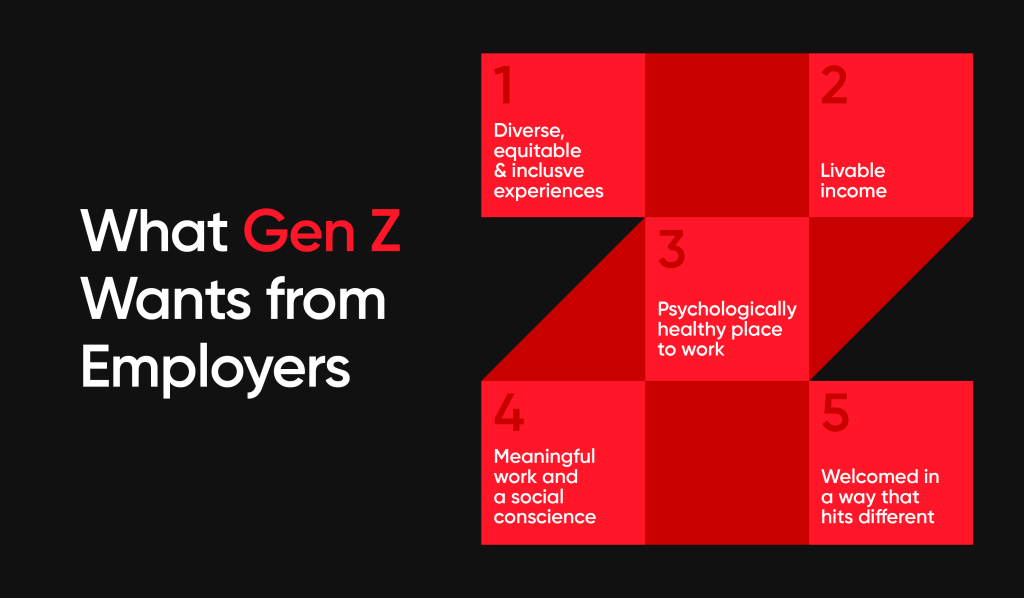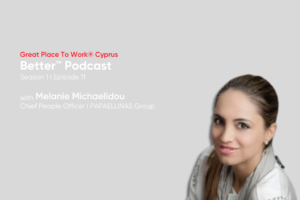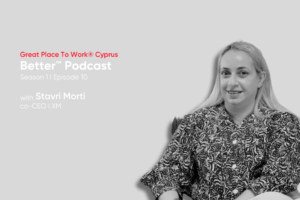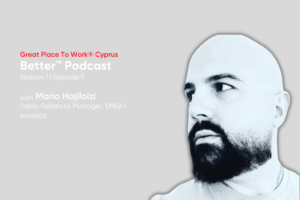
by Claire Hastwell, Great Place to Work® US
Gen Z is coming to your workplace.
The generation born between 1997 and 2012 may be just entering the workforce, but smart employers are already thinking about how their company culture can attract and retain Gen Z.
According to the Bureau of Labor Statistics, 16- to 24-year-olds made up 11.6% of the workforce in 2020, primarily in the industries of retail, hospitality, and senior living — all of which were hardest hit by the pandemic and lockdowns. Because of this, this generation has a unique perspective as new workers under extraordinary circumstances.
In our research of workplaces around the country, we’ve collected over 32,000 Gen Z employee responses from over 350 companies. Here’s what Gen Z says they want from employers in 2021 and beyond.

WHAT GEN Z WANTS FROM EMPLOYERS
1. DIVERSE AND INCLUSIVE WORKPLACE
Gen Z is tracking to be the most diverse workforce yet, with our data showing 47% of Gen Z employees identifying as
BIPOC By comparison, 39% of Millennial workers we surveyed identified as PoC, versus 34% of Gen X and only 25% of Boomers.
Pew Research Center points to changing immigration patterns —immigration to the U.S. peaked in 2005 and then declined — that have shaped Gen Z’s demographics. There are fewer Gen Zs than Millennials who are foreign-born, but a higher number who were born in the U.S. to immigrant parents.
As Gen Z grows into the workforce, employers must learn how to best manage a diverse team and get serious about DEIB initiatives. This includes:
- Ensuring a diverse slate of candidates to secure the best talent
- Training other employees (particularly older generations) on DEIB, and
- Ensuring there’s representation across the leadership team.
2. LIVABLE PAY
Pay was the number one topic Gen Z employees commented on in our research, with calls for better minimum wage and increased hourly pay. Only 69% of Gen Z employees said they feel they’re paid fairly, which is 7 points below other generations.
Because of their young age and career stage, most Gen Z employees are working in industries such as retail and hospitality, which tend to be lower-paying or reliant on tips. These were also the industries most impacted by lockdowns, leaving Gen Z workers bearing the brunt of COVID-19 furloughs and closures.
According to payroll company ADP, Gen Z was hardest hit by job losses in 2020, losing some 11% of their jobs, well above the national average (6.7%) and impacts to other age groups.
With the current hiring crunch slamming retail and hospitality in particular, employers wanting to attract Gen Z talent will need to offer fair pay and earn the trust of a generation uniquely hit by the crisis.
3. MENTALLY HEALTHY AND SAFE PLACE TO WORK
Some of the widest gaps between Gen Z and other generations are around feeling their workplaces are psychologically and emotionally healthy.
In our research, Gen Z employees showed a 7-point difference on statements measuring:
- Psychologically and emotionally healthy workplace environment
- Ability to take time off from work when necessary
The American Psychological Association has identified Gen Z as the most stressed generation, attributed to growing up while the world has faced severe global challenges like gun violence, climate change, political instability, racial reckoning and a pandemic.
Great employers will need to ensure Gen Z feels emotionally supported in the workplace, through things like regular check-ins and encouragement to practice self-care (although, to be clear, that’s something all generations could benefit from after the past year).
4. SPECIAL MEANING
Finding purpose and special meaning is something that has typically been associated with the Millennial generation. But our research found the meaning deficit is even more acute for Gen Z, who scored their employers:
- 8-points lower than other generations on how much their work has special meaning
- 7-point lower than other generations on how much they feel they make a difference at work
Grocery chain Wegmans is one example of a company that’s giving employees a voice, and 93% of Gen Z respondents at the company ranked it as a great place to work.
Wegmans management frequently seeks out ideas from the front-line workers who interact with customers the most, and all staff are invited to make suggestions and ask questions through “Ask Jack,” the company’s SVP of operations, Jack DePeters.
Since launching in 2002, Jack has responded to over 16,000 employee comments, with 68% of employees choosing to identify themselves by name rather than submit anonymously.
5. WARM WELCOME
Gen Z is still young. Many of them are just getting started in the workforce. A warm and thoughtful welcome can go a long way when you’re onboarding new grads and first-time employees.
With many employers switching to remote or hybrid workplaces post-pandemic, this can present a challenge — the usual practices of showing a new hire around the office or taking them out for lunch may no longer be an option for some workplaces.
But companies like YNAB are making it work. The software firm sends out welcome packages in the mail, timing them to arrive on an employee’s first day. The packages include YNAB swag, a booklet about the company’s vision and mission, personalized welcome messages from the team and a dinner gift card for the employee to celebrate their new job.
For someone new to the working world, efforts like this can go a long way to keeping them enthusiastic and engaged.
For years, Millennials have been the talked-about generation as brands have worked to woo them, either as customers or as employees (or both). But now that the next generation is on the workplace doorstep, employers need to start thinking now about how they’re going to attract the next gen of talent.
Latest Articles

Episode Twelve wtih Christianna Diogenous, Chief Executive Officer at Unicars

Episode Eleven with Melanie Michaelidou, Chief People Officer at PAPAELLINAS Group

Episode Ten with Stavri Morti, co-CEO at XM

Episode Nine with Mario Hajiloizi, Public Relations Manager EMEA at Amdocs


